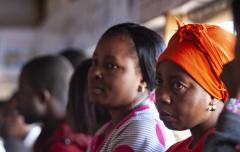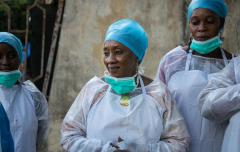Tangible benefits of accelerating electricity access in developing countries where 1 billion still lack power
New report urges greater use of decentralized renewable energy as quicker, less costly option Also reveals evidence of significant black carbon emission reductions
BONN, November 16, 2017: Rural and vulnerable populations in developing countries could miss out on multiple wide-ranging benefits if they are forced to wait years, or even decades, to get access to electricity through first-ever power from the grid instead of through quicker to deploy decentralized renewable energy solutions, according to a report announced by Sustainable Energy for All (SEforALL) and Power for All today.
The “Why Wait? Seizing the Energy Access Dividend” report presents a first-of-its-kind approach to developing a framework for understanding and quantifying the financial, educational and environmental dividends for households through accelerated access to decentralized electricity, such as solar home systems and clean energy mini-grids.
The report indicates that households in Bangladesh, Ethiopia and Kenya – which were used as report case studies – can save hundreds of dollars, equivalent to the average annual income of between 61,800 and 406,000 people depending on the country and timeframe to deliver universal access, by bringing electricity access forward through use of solar to power household services like lighting and mobile-phone charging instead of kerosene or costly external phone-charging services.
Another benefit from decentralized services is more time for studying—equivalent to the time spent in school each year of between 142,000 and 2 million students depending on the country and timeframe to deliver universal access.
Announced at the UN Climate Change Conference in Bonn, the data also shows significant black carbon emission reductions across the three countries – as much as 330 million metric tons of CO2 equivalent emissions, or roughly the emissions from 60 million passenger vehicles driven for one year– due to reduced kerosene use.
Why Wait? uses a framework for estimating the dividends of electricity access that is designed to help government leaders and other decision-makers assess the comparative advantages of different electrification options and services – ranging from more limited Tier 1 electricity service (a few hours of power a day) to more robust and costly Tiers 4 and 5 - to achieve Sustainable Development Goal (SDG) 7 of universal access to affordable, reliable, sustainable and modern energy for all by 2030.
Speaking on the announcement, Rachel Kyte, Special Representative to the UN Secretary-General and CEO, Sustainable Energy for All, said: “Decision makers are faced with competing priorities against finite resources. “Why Wait” provides powerful evidence on the development gains that can be achieved by focusing on integrated energy strategies that advance energy access. Household savings and hours of study time that are won because of access to energy. Denying those gains by not prioritizing solutions to energy access risks holding back whole generations. Decentralized renewable energy is an attractive option for closing the energy access gap quickly, especially for remote rural areas. This work shows it can bring prosperity and education outcomes as well as other services energy provides.”
"Default approaches to electrification that rely on slow, expensive, fossil-fuel-powered centralized generation are out of date and out of time," said Kristina Skierka, CEO of Power for All. "The Energy Access Dividend challenges business-as-usual by valuing 'time to access'—for the first time specifying the opportunity cost of large-scale projects that may never reach the 1 billion people around the world who still have to live without the benefits of electricity. Properly supported, decentralized renewable energy can deliver socio-economic dividends faster and at a lower cost."
The report, produced in partnership with the Overseas Development Institute, comes just 12 years ahead of global energy goal deadlines, as many countries remain behind schedule in getting there. Just over one billion people are still living without electricity, according to the latest Global Tracking Framework report issued in May.
Bangladesh, Ethiopia and Kenya were chosen as case studies in the report due to their wide-ranging differences in terms of income levels, demographics and electrification rates. The countries also have significant energy access gaps, accounting for more than 180 million of the one billion people still living without power.
For more information and a full list of partners, please see below or visit our web sites at SEforALL.org/WhyWait and PowerForAll.org
–ENDS–
NOTES TO EDITORS
Rachel Kyte, CEO and Special Representative to the UN Secretary-General for Sustainable Energy for All and Kristina Skierka, CEO, Power for All will be in Bonn and available for interview. For any requests, please email media@SEforALL.org
Contact
For further details on the announcement or any interview requests, please contact:
Beth Woodthorpe-Evans, Sustainable Energy for All: beth@SEforALL.org | +1 202 390 1042
William Brent, Power for All: william@powerforall.org | +34 684 314 268
About Sustainable Energy for All
Sustainable Energy for All (SEforALL) empowers leaders to broker partnerships and unlock finance to achieve universal access to sustainable energy, as a contribution to a cleaner, just and prosperous world for all. SEforALL exists to reduce the carbon intensity of energy while making it available to everyone on the planet. For more information, visit SEforALL.org and follow us at @SEforALLorg.
About Power for All
Power for All is a global coalition of more than 200 companies, civil society groups and other organizations campaigning to deliver universal electricity access before 2030 by scaling decentralized renewable energy (DRE). Power for All is present in Sub-Saharan Africa and South Asia, where it collaborates with partners to advance the DRE sector as the fastest, most cost effective and resilient path to achieving Sustainable Development Goal 7 (SDG7) --access to affordable, modern, sustainable and reliable energy. Coalition partners represent a range of technologies, in both size and type, from pico products to mini-grids, and from micro-hydro and biomass to solar. For more information, visit powerforall.org and follow us at @Power4All2025
Methodology
The report was commissioned by SEforALL and Power for All, produced and authored in partnership with the Overseas Development Institute. The framework factors in different time differences for delivering electricity access through alternative options involving decentralized and centralized grid-scale power. The different time assumptions used for the three countries are: the government’s target goal for achieving full electricity access; the rate required to achieve the 2030 universal energy access goal; and the historical rate, based on electrification progress from 2010 to 2014.



